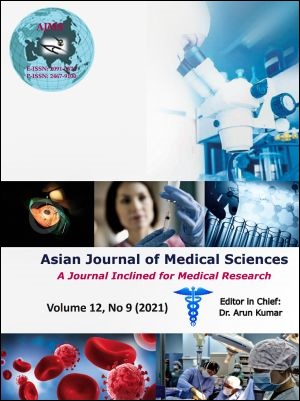Endocrine dysfunctions may be sequelae of snake bite
Keywords:
Snake bite, Survivors, Endocrine dysfunctions, Serum creatinine, Blood pressureAbstract
Background: At present snakebite has become a serious health problem in India. The actual incidence of mortality and morbidity related to the snakebite are not reported properly. Further, the most neglected part is the long term endocrine dysfunctions in survivors of snake bite.
Aims and Objectives: To evaluate serum fT4, TSH, cortisol, prolactin, and testosterone levels in snake bite survivors after 3 and 6 months of snakebite.
Materials and Methods: Forty-five survivors of russels viper bite patients were selected for the study according to inclusion and exclusion criteria. Admitted patients were treated accordingly and discharged in stable condition. The hormonal status were analysed and they have been followed up after 3 and 6 months.
Results: Significant decrease in serum cortisol and prolactin were observed in survivors of russels viper bite patients particularly in them whose mean serum creatinine was more than 1.2 mg/dl and systolic blood pressure was <110 mm of Hg and diastolic Blood pressure was < 70 mm of Hg.
Conclusion: Measurement of long term hormonal status like serum cortisol and prolactin can be beneficial in survivors of hematotoxic snake bite patients.
Downloads
Downloads
Published
How to Cite
Issue
Section
License
Copyright (c) 2021 Asian Journal of Medical Sciences

This work is licensed under a Creative Commons Attribution-NonCommercial 4.0 International License.
Authors who publish with this journal agree to the following terms:
- The journal holds copyright and publishes the work under a Creative Commons CC-BY-NC license that permits use, distribution and reprduction in any medium, provided the original work is properly cited and is not used for commercial purposes. The journal should be recognised as the original publisher of this work.
- Authors are able to enter into separate, additional contractual arrangements for the non-exclusive distribution of the journal's published version of the work (e.g., post it to an institutional repository or publish it in a book), with an acknowledgement of its initial publication in this journal.
- Authors are permitted and encouraged to post their work online (e.g., in institutional repositories or on their website) prior to and during the submission process, as it can lead to productive exchanges, as well as earlier and greater citation of published work (See The Effect of Open Access).




